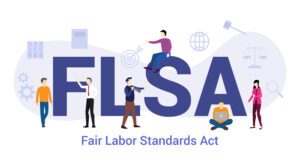FLSA Overtime and Salary Changes – Put on Hold

No longer going into effect December 1, 2016
This just in…
- A federal court, on November 22, 2016, issued an injunction to temporarily stop the Department of Labor from implementing the new rules which were set to change, among other changes, the minimum salary that must be paid to exempt employees, which may impact an employee’s eligibility for overtime, from $23,660 to $47,476 per year, under the Fair Labor Standards Act (FLSA). The ruling comes after a number of states challenged the planned changes, arguing they are unlawful. However, this ruling applies to all states nationwide.
- These new rules were set to go into effect December 1, 2016; now the law will remain unchanged until further notice, as the case continues to make its way through the civil court process.
- This halt is temporary. However, it could be many months (or longer) before it is known whether the rules will go into effect as originally written, whether a different set of new rules will go into effect, or whether the salary and overtime requirements of the FLSA will remain unchanged.
What do you do now?
- Many employers have already made changes in anticipation of the new rules, and many more are prepared to make them December 1.
- If you’ve already implemented any compensation changes, stick with them.
- If you’ve informed any employees of an upcoming compensation change, but do not plan to implement it until December 1, continue with your planned change.
- If you have made or planned to make classification changes (reclassifying a formerly exempt employee as non-exempt and now eligible for overtime pay – for example, someone that was paid a salary of $30,000 and was “exempt” and you planned to keep their pay the same but convert them to hourly and non-exempt), your options are more complicated, depending on the situation; you may benefit from a proper legal consultation on this issue.
- While it is not illegal per se to reduce or otherwise change someone’s pay, reversing course on an employee who was expecting certain changes (whether the employee viewed the changes as good or bad) can bring you additional problems and possible repercussions.
- If you had not yet made any changes or informed employees of any planned changes, but were planning to do so soon, you can wait it out if you’d like.
Do you still need an attorney’s advice on how to handle this?
- Yes, if you have any questions or uncertainty about who qualifies to be classified as exempt (regardless of salary level).
- The FLSA allows employees to be exempt only if those employees’ job duties fit into certain exempt categories and are paid a specific salaried amount.
- Exempt ≠ Salaried!
- If you have a salaried employee now who is paid over $23,660, you may still be violating the existing law if that employee does not meet the duties test to be exempt under the FLSA. Many employers have struggled with understanding and complying with this lesser-known aspect of the law.
- You can benefit from a brief telephone consultation regarding any salaried exempt employees you have and whether they meet the duties test. You may also wish to review your various options depending on how this issue is resolved in the federal court.
